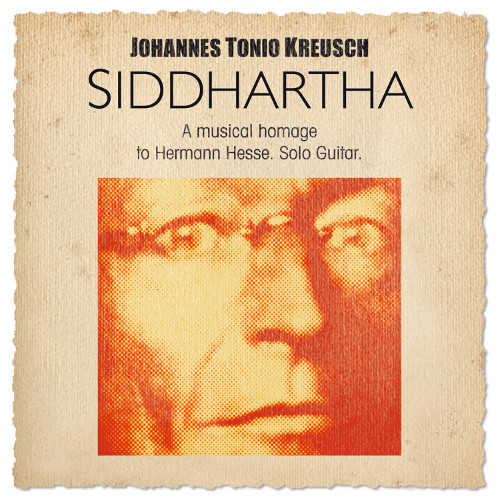CD: Siddhartha
back to Classical / Jazz / World

Release date: 2019
Listen to or buy this album
A solo gem of beguiling beauty.
Jazz Podium
Feat.:
Johannes Tonio Kreusch: guitar
Tracks
Part I
01. Awakening
02. Rejoicing
03. Breathing
04. Flowing
05. Flying
06. Surrendering
07. Praying
Part II
08. Vasudeva (Atman)
09. Sabsara
10. Samana
11. Gotama
12. Kamala
13. Govinda
14. Om
Reviews
Akustik Gitarre (Harald Wittig): “Kreusch proves with this very personal album that he is one of the most creative classical guitarists of the present day. (…) Even if comparisons are always problematic: those who can do something with Ralph Towner, for example, will not be disappointed here either. (…) This album is a clear rejection of superficial virtuosity; technology is at the service of music. And this is worth listening to for anyone who is alien to drawer thinking.”
Jazz Podium (Jörg Konrad): “Johannes Tonio Kreusch walks light-footedly between the musical worlds and creates timeless snapshots in an incomparable way. Kreusch (…) creates multi-layered atmospheres that sometimes come with only a few sounds, but radiate an incredible depth and emotional solemnity (…) the guitarist has succeeded in creating a solo gem of beguiling beauty.”
about: Siddhartha
The new album by Johannes Tonio Kreusch – a musical homage to Hermann Hesse’s famous story SIDDHARTHA. “SIDDHARTHA is a searcher. I want to be this in my music as well – a seeker of new sounds and musical expressions,” says Johannes Tonio Kreusch.
The SIDDHARTHA Suite takes the listener into unprecedented sound spaces. Johannes Tonio Kreusch draws a wonderful wealth of timbres and effects from his instrument. The fourteen movements of the full-length SIDDHARTHA Suite correspond to the chapters of the novel. They contain both composed sections and improvised passages. SIDDHARTHA’s search for the primal ground of his soul is traced by Johannes Tonio Kreusch as hauntingly as creatively musically. The virtuosity offered is subordinate dissuitable only to music and unfolds with great self-evidentness.
“My music for Hermann Hesse’s SIDDHARTHA is not necessarily intended as an underscore or retelling of this magnificent novel. Rather, I would like to approach the essence and the different soul moods that make up this work musically. It also inspired me less the idea of Eastern philosophy, but Siddhartha’s constant search, which is rewarded with finding in the end. Philosophical themes are often sources of inspiration for my music. Before I came to study music, I first studied philosophy. After graduating from high school, I was by no means immediately sure that I wanted to study music and make it my profession. After many years of one-sided learning at school, I finally wanted to study something that could inspire me very much in terms of ideas. And that’s where I ended up with philosophy.
In my opinion, it is not so absurd that one is particularly drawn to philosophical ideas as a musician or artist, since music or art offer borderline experiences that confront us with a world beyond the material. When he plays, he is closest to God, the conductor Sergiu Celibidache once said. In fact, it is precisely the arts that open the door to this other world – into the world beyond the material: one suddenly experiences this communal being in the common making of music or in the joint listening of a concert … there one experiences the healing power of beautiful forms or sounds, when unexpectedly deep agreement arises with what is heard or viewed… there one is inspired by a thought, carried by an uplifting idea…
And I think that’s what makes music: that you get away from the overly material thinking towards: “Quicker! Higher! Next!…”
In my music I usually use very different guitar moods and also preparations such as pens, paper clips or rings, which I put between the strings. This allows me to discover new sound spaces and often make the guitar sound like another plucked instrument – like a sitar, a cora or a koto. On my SIDDHARTHA CD I don’t use the conventional guitar tuning once.
It was always important to me to approach music experimentally and thus also to break new paths of interpretation. After intensive music studies and an in-depth examination of classical literature, I became more and more oriented towards self-creativity and improvisation. Classical music nowadays is often seen as something rigid that must not be touched or changed. In earlier epochs, improvisation was always an important part of the art of music. Music, and we must never forget this in times of machine reproducibility, must always preserve this “from the moment” creature. Simply playing patterns and what you have learned does not really lead to the goal. It is from this attitude that my SIDDHARTHA music came into being.”
Johannes Tonio Kreusch